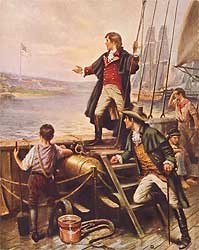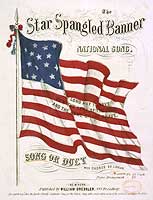| Pratt Street Riot | Baltimore Bastille | Habeas Corpus | Coast Guard | Garrison Flag | Timeline | All Photos |

|
|
The Star Spangled Banner Percy Moran, artist, c1913. |
History of the Star Spangled Banner
Oh say can you see
by the dawn's early light...
There is little basis for the legend that the tune of our national anthem was an old English drinking song. On the other hand, there is strong evidence that the members of the club for which the music was originally composed, the Anacreontic Society, frequently lifted not only their voices but also their cups in song.
In the mid-1760s, a London society of amateur musicians, the Anacreontic Society, commissioned a young church musician, John Stafford Smith, to compose music for material written by its president, Ralph Tomlinson. Smith's tune, entitled "Anacreon in Heav'n," was a vehicle not only for the Society's accomplished amateurs, but for its best baritone singer to display virtuosity through an astounding vocal range. Its musical complexity has been compared to that of the famous "Toreador Song" in Bizet's opera Carmen.
First published in England, the tune appeared in North America before the end of the eighteenth century where, as often happened, new lyrics -- including "Adams and Liberty" and "Jefferson and Liberty" -- were written. The song's appeal may have been due at least in part to its unique metrical structure. Not found in any other song of the period, its striking meter may have been what attracted Francis Scott Key. By all accounts tone deaf, Key had already composed one other poem using the meter of the "Anacreontic Song" when he wrote "The Star Spangled Banner."

|
| The Star spangled banner : national song (music cover). Stackpole, 1861. |
On September 14, 1814, while detained aboard a British ship during the bombardment of Ft. McHenry, Francis Scott Key witnessed at dawn the failure of the British attempt to take Baltimore. Based on this experience, he wrote a poem that poses the question "Oh, say does that Star-Spangled Banner yet wave?" Almost immediately Key's poem was published and wedded to the tune of the "Anacreontic Song." Long before the Civil War "The Star Spangled Banner" became the musical and lyrical embodiment of the American flag. During the latter war, songs such as "Farewell to the Star Spangled Banner" and "Adieu to the Star Spangled Banner Forever," clearly referencing Key's song, were published within the Confederacy.
On July 26, 1889, the Secretary of the Navy designated "The Star Spangled Banner" as the official tune to be played at the raising of the flag. And during Woodrow Wilson's presidency, it was chosen by the White House to be played wherever a national anthem was appropriate. Still the song was variously criticized as too violent in tone, too difficult to sing, and, by prohibitionists, as basically a drinking song. But on its side "The Star Spangled Banner" had a strong supporter in John Philip Sousa who, in 1931, opined that besides Key's "soul-stirring" words, "it is the spirit of the music that inspires." That same year, on March 3, President Herbert C. Hoover signed the Act establishing Key's poem and Smith's music as the official anthem of the United States.
The new law, however, did not specify an official text or musical arrangement, but left room for creative arrangements and interpretations of "The Star Spangled Banner." The standard instrumental version was unofficially established as the arrangement used by the U.S. service bands. However, other versions include: Igor Stravinsky's 1941 version for orchestra and male chorus, Duke Ellington's 1948 Cornell University arrangement, Jimi Hendrix's 1969 electric guitar version, José Feliciano's 1968 rendition, and the 1991 version by the St. Louis Symphony under Leonard Slatkin.
The Star-Spangled Banner
Francis Scott Key, a young poet-lawyer, witnessed the bombardment of Fort McHenry while under British guard on an American truce ship in the Patapsco River. Seeing his country's flag still flying over the Fort the next morning, he was moved to pen these immortal lines:
What so proudly we hailed at the twilight's last gleaming?
Whose broad stripes and bright stars, thro' the perilous fight;
O'er the ramparts we watched, were so gallantly streaming.
And the rockets red glare, the bombs bursting in air,
Gave proof through the night that our flag was still there.
Oh, say, does that star-spangled banner yet wave
O'er the land of the free and the home of the brave?
***
On the shore dimly seen, thro' the mists of the deep,
Where the foe's haughty host in dread silence reposes,
What is that which the breeze, o'er the towering steep,
As it fitfully blows, half conceals, half discloses?
Now it catches the gleam of the morning's first beam,
In full glory reflected, now shines on the stream;
'Tis the star-spangled banner: oh, long may it wave
O'er the land of the free and the home of the brave.
***
And where is that band who so vauntingly swore
That the havoc of war and the battle's confusion
A home and a country should leave us no more?
Their blood has wash'd out their foul footstep's pollution.
No refuge could save the hireling and slave
From the terror of flight or the gloom of the grave,
And the star-spangled banner in triumph doth wave
O'er the land of the free and the home of the brave.
***
Oh, thus be it ever when free men shall stand,
Between their loved homes and the war's desolation;
Blest with vict'ry and peace, may the heav'n-rescued land
Praise the Power that has made and preserved us as a nation.
Then conquer we must, when our cause is just,
And this be our motto: "In God is our trust";
And the star-spangled banner in triumph shall wave
O'er the land of the free and the home of the brave.